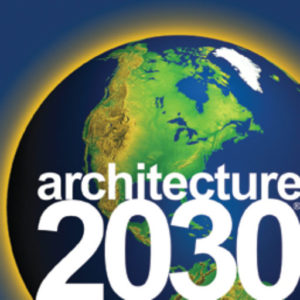2030 Curriculum Project: Pilot Underway
Innovative Courses Selected for 2016-2017 Academic Year
Seven courses have been selected to participate in the pilot phase of the 2030 Curriculum Project, Architecture 2030’s initiative to support university courses that ‘fully integrate lessons in energy use, emissions, and resiliency into the widest possible range of projects and topic areas, and across all year levels.’
Over 20 proposals were submitted from 18 US schools in 10 states, from graduate and undergraduate degree programs in architecture, planning, engineering, construction management, and real estate development. “The seven selected courses represent creative and resourceful efforts by individual faculty and program chairs to integrate critical issues of sustainability into core and early design studios, history courses, and other program areas where this material has not been traditionally or adequately addressed,” said Anthony Guida, Program Director at Architecture 2030. Over the course of the 2016-2017 academic year, Architecture 2030 will support participating faculty through course development assistance, software resources, connections to expert practitioners, and the continued development of the 2030 Palette.
Architecture 2030 will also share the details of these inspiring courses and their successful outcomes, so that they can serve as models for transforming the culture of design education in architecture and planning programs nationwide.
Here are details on the seven courses that were selected:
| Ball State University, Architecture Andrea Swartz, Olon Dotson, Michele Chiuini, Joseph Bilello, Enrique Ramirez, Wes Janz, Pamela Harwood, and Kevin Klinger ARCH 401 Architectural Design, Fall 2016 |
An undergraduate 4th year comprehensive design studio on zero net energy (ZNE) and socially resilient housing in the post-industrial city, with multiple sections/instructors. Students will design in Fall 2016 and then construct a ZNE single-family residence in Spring 2017. Design instruction incorporates the 2030 Palette and energy modeling in Sefaira. |
| Cal Poly Pomona, Architecture Pablo La Roche ARC 402 Carbon Neutral Design Studio, Winter 2016 |
An undergraduate topic studio focused on carbon neutral design. Instruction highlights high-performance design process and integrates Climate Consultant, the 2030 Palette, and multiple tools for energy and daylight modeling. |
| Cal Poly San Luis Obispo, Architecture Stacey White (with Margot McDonald) ARCH 207 Environmental Control Systems I, Fall 2016 |
A successful early curricular model now in its 5th year, this is an undergraduate 2nd year environmental controls course that is fully integrated with a concurrent design studio (with up to 10 sections/instructors). Course instruction promotes energy modeling early and often, enabling high performance results while accommodating a diversity of design approaches. |
| University of Southern California, Real Estate Development Liz Falletta RED573 Design History and Criticism, Summer 2017 |
This design studio teaches the value of design and sustainable development to graduate real estate development students. Course instruction integrates the 2030 Palette and Autodesk’s FormIt and Insight360 into design proposals for a mid-rise infill development in urban Los Angeles. |
| University of Texas at San Antonio, Architecture Ian Caine and Rahman Azari ARC 6136 San Antonio 2040: New Housing Models for the Flat City II, Fall 2016 |
An undergraduate 3rd and 4th year topic studio that aims to develop increased housing density in the suburban condition while designing for all aspects of building performance, including 2030 Challenge goals, net zero carbon and water, as well as other measures. This studio incorporates Climate Consultant, Sefaira, and Athena, and is also participating in the AIA COTE student competition. |
| University of Washington, Urban Design and Planning Rachel Berney URBDP 508A Community Design, Planning, and Development in the Bajo Lempa, El Salvador, Fall 2016 |
A graduate planning studio on environmental management, sustainable agriculture, and the development of carbon neutral eco-tourism for the Bajo Lempa, El Salvador. The studio will use the 2030 Palette for analysis and produce a custom set of all-new Swatches, which will be part of a book on sustainable development lessons for/from this region. |
| Woodbury University, Architecture Kishani De Silva, Michael Pinto, and Catherine Roussel Arch 620 Practice 1, Fall 2016 |
A graduate professional practice course taught through the lens of sustainability and resiliency issues. Weekly guest lecturers and student projects address energy policy, building codes, high-performance building practice, affordable housing, and other critical issues for practitioners in Los Angeles region and State of California. |
The pilot phase of the 2030 Curriculum Project was made possible through the generous support of the Allen H. and Selma W. Berkman Charitable Trust.
Architecture School image by Aitor Aguirregabiria used under Creative Commons License




